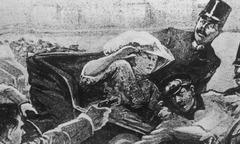
World War 1
Quiz by J Crissman
Feel free to use or edit a copy
includes Teacher and Student dashboards
Measure skillsfrom any curriculum
Measure skills
from any curriculum
Tag the questions with any skills you have. Your dashboard will track each student's mastery of each skill.
With a free account, teachers can
- edit the questions
- save a copy for later
- start a class game
- automatically assign follow-up activities based on students’ scores
- assign as homework
- share a link with colleagues
- print as a bubble sheet
39 questions
Show answers
- Q1This was the spark that started World War I.The assassination of Archduke Franz Ferdinand30s
- Q2This was the president who was elected in 1912, and led the US into WWI. Later wrote a plan for post-WWI peace known as the Fourteen Points.Woodrow Wilson30s
- Q3This Central Power empire during WWI, started the war with their invasion of Serbia after the assassination of Archduke Ferdinand on June 28, 1914 .Austria-Hungary30s
- Q4This Serbian rebel group tassassinated Archduke Ferdinand after several failed attempts.The Black Hand30s
- Q5This German Emperor led the Germans during WWI. In 1918 he was forced to step down by German Generals.Kaiser Wilhelm II of Germany30s
- Q6This new machinery used by the Germans in sea warfare, to attack British and American supply ships in the North Sea and the Atlantic Ocean.U-boats30s
- Q7This cause of World War I was based on an intense pride in one's nation.Nationalism30s
- Q8This alliance during WWI included the United States, Great Britain, France, Russia and Italy (switched to the Allied Powers in 1915). (The blue countries of the East and West on map above)Allied Powers30s
- Q9This is the plan for post-World War I outlined by President Wilson in 1918. This plan called for self-determination (countries in Africa and Asia govern themselves), freedom of the seas, free trade, end to secret agreements, reduction of arms and a league of nations.Wilson's Fourteen Points30s
- Q10the reason the US did NOT join the League of NationsUSA's Congress30s
- Q11USA's predominate stance on whether or not they should enter the war.Isolationism30s
- Q12This intercepted note from the German foreign minister to the Mexican government offered, territories in Texas, Arizona and New Mexico for Mexico. The note also confirmed the new policy of unrestricted submarine warfare by Germany against the Allied Powers. This helped turn Americans against Germany in WWI.Zimmerman Telegram30s
- Q13This British passenger ship was sunk by German U-boats in 1915, carrying civilians and ammunition to Britain from the U.S. The event turned American opinion against Germany.Lusitania30s
- Q14This style of warfare was common in WWI, due to the invention of the machine gun and heavy artillery. It included digging long trenches, separated by barbed wire and a no mans land.Trench Warfare30s
- Q15This was the agreement between the Allies and Central Powers that ended the fighting after WWI. It began at 11/11/1918 at 11:11 am. This marked a victory for the Allies and stated that the Central Powers lost. Germans would later look at this as "the stab in the back."Armistice, 191830s
